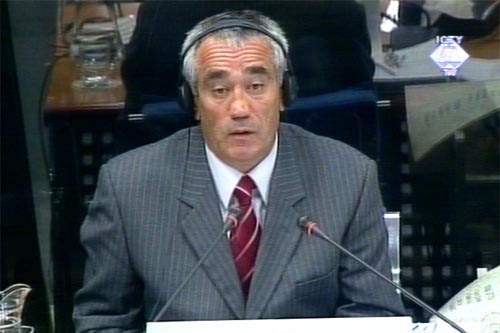Home
GENERAL DOESN’T CARE WHO'S PAYING HIM
The 40th Personnel Centre of the VJ General Staff in Belgrade "made it technically possible for a soldier of a state not involved in war to fight in another state"
 Milos Djosan, defense witness for Milosevic
Milos Djosan, defense witness for Milosevic General Milos Djosan said to the court he was "a Serb from the former BH". Now, prosecutor Geoffrey Nice asked him, beginning the cross-examination, what he was doing in Croatia in the first half of 1995. The general replied he was the commander of the 44th Rocket Brigade of the Serbian Army of Krajina "in the territory controlled by the UN" and that he was "helping his people after the NATO launched air strikes against the Republic of Serbian Krajina". As he explained, this was "made technically possible" by the 40th Personnel Centre of the General Staff in Belgrade. The prosecutor wanted to know "how it is made technically possible for a soldier of a state not involved in war to fight in another state". The general didn’t know or didn’t want to answer the question.
Neither did the general know who paid his salary in 1996 and 1997 when he was the Chief of Air Defense in the Republika Srpska Army, stationed in Banja Luka. He claims he "was not interested". The prosecutor explained to him that in that case he was on the payroll of the 30th Personnel Centre in Belgrade. According to the prosecutor, those two personnel centers prove that during the wars in Croatia and BH Belgrade not only supported but in fact controlled the Serbian Army of Krajina and the Republika Srpska Army.
As the witness said he had been stationed in Batajnica in 1991 and 1992, the prosecutor asked him if he knew anything about the mass graves containing bodies of Kosovo Albanians found there. The witness claimed he had no knowledge of that. The prosecutor did not believe him, claiming he "had to know", for at least two reasons. The first is that an investigation was carried out, involving the District Court, the Forensic Institute and the Medical School in Belgrade. The second reason is that a large number of bodies exhumed in Batajnica originally came from Djakovica, Korenica and Meja – the area in which General Djosan was the garrison commander in 1999. On 27 and 28 April 1999, more than a hundred Kosovo Albanians were killed in Meja and Korenica, it is alleged in the indictment. The prosecution presented evidence to corroborate the allegations in the course of its case.
The witness replied that he had not seen the findings of the institutions investigating the Batajnica case and that he did not know how the bodies from Djakovica, Korenica and Meja got to a location close to Belgrade. He added he did not believe this and that "it would be crazy for someone to transport bodies from Kosovo to Belgrade". When the prosecutor asked him whether he was claiming that the Albanians and NATO had exhumed the bodies, taken them to Serbia and buried them in the training area of the Special Operations Unit, Djosan said he did "not want to speculate", but that "after Markale, everything is possible".
In the examination-in-chief, General Djosan contested almost all the claims made by Captain Nik Peraj in his statement to the prosecution. Peraj was his subordinate in 1999 in Djakovica. General Djosan claimed the statements had been made "under blackmail and duress". The prosecutor read out parts of the statements in which Peraj gives a very high opinion of Djosan, his commanding officer, describing him as "sensitive", "responsible" and "conscientious" man and officer, who did not agree with the way in which the Meja operation had been carried out. When asked "what interest could the KLA have in making Peraj to speak so highly of his commander," General Djosan replied that it was "a tried and tested way to disseminate disinformation."
The cross-examination of General Milos Djosan will continue on Tuesday, 25 October.
Linked Reports
- Case : Milosevic Slobodan - "Kosovo, Croatia and Bosnia"
- 2005-10-19 GENERAL VS. CAPTAIN
- 2005-10-18 LINK BETWEEN AIR STRIKES AND DEPORTATION
- 2005-10-18 MILOSEVIC TO CALL ANOTHER 199 DEFENCE WITNESSES
- 2005-10-25 "FEAR KEEPS THE HOUSE SAFE"
- 2005-10-26 THE CRIMES "DID NOT HAPPEN" OR "WERE NOT CRIMES AT ALL"
- 2005-10-27 NATO’S KOSOVO CONSPIRACY
